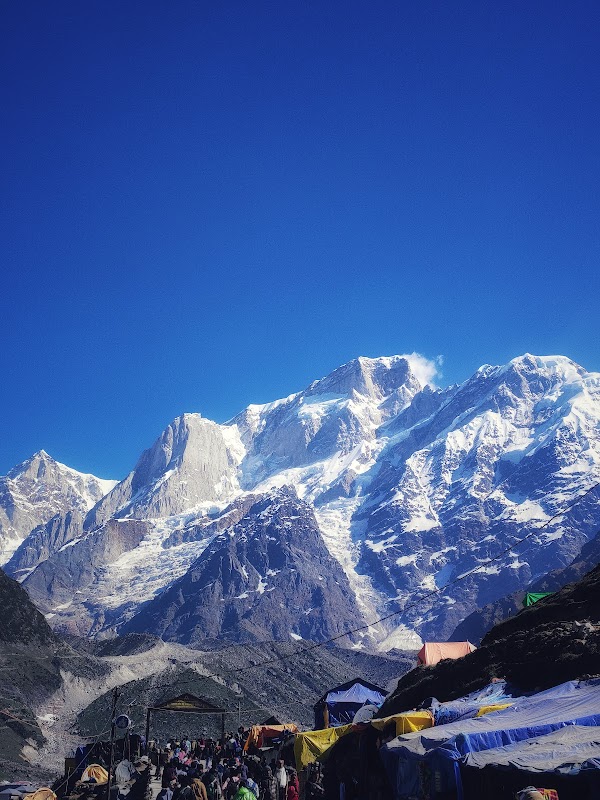
Evening Awe at Triveni Ghat: Experiencing the Ganga Aarti in Rishikesh
Experience the Ganga Aarti at Triveni Ghat in Rishikesh, where the river and flame unite in a moving ritual at sunset. This accessible, immersive ceremony offers a rare chance to engage with a living tradition set against the relentless flow of the Ganges.
Arrive Early to Secure a Good Spot
The ghat fills quickly as the ceremony approaches; arriving at least 30 minutes early helps you find an unobstructed view and settle in comfortably.
Wear Comfortable, Easy-to-Remove Footwear
The steps to the ghat can be wet and slippery, and you’ll likely need to remove shoes for certain rituals near the water’s edge.
Stay Hydrated and Mind the Crowd
Bring water and be prepared for tight spaces. The ceremony is low physical demand but the crowd density can be challenging for some.
Respect Local Customs and Photography Rules
Ask permission before photographing individuals and avoid flash during the ceremony to maintain the ritual's sacred atmosphere.
Evening Awe at Triveni Ghat: Experiencing the Ganga Aarti in Rishikesh
As twilight descends along the banks of the Ganges, Triveni Ghat in Rishikesh wakes to a gathering energy. The river, ever restless, draws crowds who come not just to witness but to engage in the Ganga Aarti—a ritual where flames and chants meet in a powerful exchange with the rushing currents below. The air hums with the murmur of the river mixed with the fragrance of incense and marigolds, while rows of oil lamps flicker against the darkening water.
Arriving at Triveni Ghat requires minimal effort; the ghat is easily accessible from Rishikesh town center with a short walk of under 1 kilometer from the main street. The terrain is flat and can accommodate most visitors comfortably, but the increasing crowd as the sun sets means arriving early is practical to secure a good vantage point.
The Ganga Aarti here transcends spectacle—it’s a call to respect the river’s power. Priests perform synchronized movements, waving multi-tiered brass lamps, while locals and travelers join hands or offer flowers to the flames. The river itself acts like a mirror, flickering with the lamplight, daring you to match its ceaseless flow.
For those looking to engage more deeply, consider the timing: the ceremony starts at sunset, a roughly 45-minute experience. Show up 30 minutes early to avoid the rush and catch briefing from volunteers if you are curious about the ritual’s details. Footwear should be easy to remove—many step onto the wet steps by the river’s edge. Hydration isn’t a huge factor here but carry a bottle for comfort during warm periods.
While the crowd may challenge tranquility, it also builds a shared sense of respect and awe. Sound carries differently here—chants reverberate off the ghats and hillsides, wrapping the ceremony in natural acoustics. The Ganga slips past, pushing forward no matter the human moment.
Photography enthusiasts will find a dynamic scene with shifting lights and shadows. Capture the flames against the deep blue backdrop of twilight or the intricate patterns of the brass lamps in motion. While tripods aren’t practical amid crowds, a steady hand and high ISO settings work well.
Planning your visit to Triveni Ghat’s Ganga Aarti blends ease with excitement. It’s a low-impact activity yet a profound encounter with nature and culture fused on the edge of a river that carries centuries of devotion downstream. Whether a casual visitor or a seasoned traveler, this ritual at Rishikesh’s heart offers a direct, grounding experience—an evening where water, flame, and human spirit meet fiercely and clearly.
Nearby Trips
All Adventures
Boat Charters
Water Activities
Adventures near Rishikesh, Uttarakhand
Discover the unique and memorable adventures that make Rishikesh, Uttarakhand special.
Frequently Asked Questions
Is the Ganga Aarti at Triveni Ghat open to all visitors?
Yes, the Ganga Aarti is a public event welcoming locals and tourists alike. However, it is a religious ritual, so respect and appropriate behavior are expected.
Can I participate in the ritual or just observe?
Visitors mostly observe and may offer flowers or light small lamps as part of the ceremony. Participation in conducting the Aarti itself is reserved for trained priests.
Are there any safety concerns near the riverbank?
The stone steps can be wet and slippery, especially during or after rain. Always watch your footing and avoid getting too close to the water’s edge, particularly when crowded.
What wildlife might I encounter around Triveni Ghat?
While the immediate area is urban, you may spot river birds such as kingfishers, egrets, and occasionally turtles basking on the rocks near the water.
Is photography allowed during the ceremony?
Photography is permitted but should be discreet and without flash to avoid disturbing participants and to maintain the sanctity of the event.
What is the historical significance of Triveni Ghat's location?
Triveni Ghat is considered a sacred confluence where three rivers meet. It has served as a spiritual hub for centuries, anchoring many traditional river rites and ceremonies.
Recommended Gear
Comfortable walking shoes
Ideal for navigating the uneven, occasional wet surfaces of the ghat steps and nearby streets.
Warm layer
Necessary during colder months to stay comfortable during the evening ceremony.
Small flashlight or headlamp
Helpful for navigating safely after dark but avoid flash photography during the ritual.
Water bottle
Stay hydrated especially in warmer months while waiting or standing through the ceremony.
Local Insights
Hidden Gems
- "The quiet side steps near the northern end of Triveni Ghat offer perfect solitude away from the main crowd with a clear river view."
Wildlife
- "Look for the kingfisher diving boldly against the current and spot river otters occasionally playing near the rocks downstream."
History
"Triveni Ghat has long been a focal point for river worship and local festivals, dating back hundreds of years, anchoring Rishikesh's reputation as a spiritual destination."
